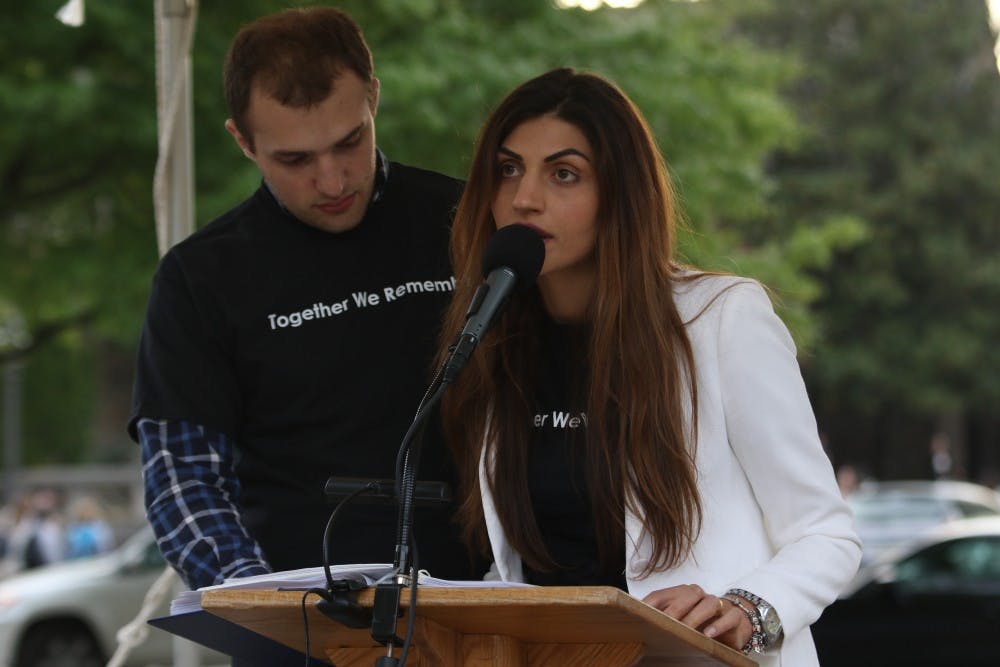Through the ongoing efforts of David Estrin and others, the annual name-reading ceremony for genocide victims at Duke may turn into a global event next year.
Estrin, Trinity ’13, founded the Coalition for Preserving Memory in 2012 with the goal of remembering genocide victims in the Holocaust as well as in places like Rwanda and Cambodia in a meaningful way. Since its creation, CPM has performed the name readings at Duke four years in a row. In coordination with CPM, Estrin plans to stage a worldwide name reading in April 2016, through an online campaign centered on the hashtag #TogetherWeRemember. The proposed event would be the largest name reading of genocide victims ever, Estrin wrote in an email May 28.
“The #TogetherWeRemember campaign will enable the global community to remember humanity at its worst to inspire humanity to be its best,” he wrote.
Estrin said his hope is for communities around the world to coordinate these readings using a “starter kit”—which will include a list of names and a template for a Google Doc in which people can sign up for shifts to read the names. Each community can decide how long its event will run, ranging from one to 24 hours. All the community needs is a central location and amplified sound, he added.
Despite starting a job at a global development firm, Estrin said he decided six months ago that his true passion was advocating genocide remembrance.
“I asked myself, ‘what legacy do I want to have?’ and at the end of the day, it’s this,” he said.
Although Estrin is working with the CPM chapter at Duke, the worldwide name reading initiative remains independent for now as he continues to shape its strategy, he explained.
To promote the readings, Estrin has started a website to explain the initiative's mission and has also been focusing on social media platforms such as Twitter, Instagram and Facebook. He said he was inspired by the popularity of the ALS ice bucket challenge, which he hopes can serve as a model for the campaign.
In addition, he and a group of filmmakers have been gathering video content to be used in a two-hour documentary and a series of promotional videos.
“The documentary will show that a couple of students with a crazy idea can come together and potentially change the world,” he said.
Estrin began by filming the readings at Duke this year and interviewing students and faculty, he said. He then traveled to Europe to record his grandmother’s first visit to her home in Budapest, Hungary, since she was taken from her house by Nazi soldiers. That was followed by his trip to the Austrian concentration camp that had imprisoned his grandfather.
His next project is to travel around the world to different places where genocides have occurred, filming his experiences and gathering names to include in the readings—a task he and others acknowledged may prove difficult.
“Getting names is challenging because they’re hard to find, and no one wants to find them,” said Matthew King, a sophomore and member of CPM who has worked with Estrin on the project.
As they gather names of genocide victims, Estrin and his collaborators will have to navigate the potential problems associated with which names are read, said Catherine Admay, visiting professor of public policy. Admay has been advising Estrin on the event.
“How do we avoid a very troubling paradox: at the same time that we are honoring one kind of suffering, how do we not become part of normalizing the silence around another?” she wrote in an email Monday.
Estrin said he is also considering starting a symposium at Duke in the Fall for academics and leaders of nonprofit organizations to share their knowledge on genocide.

Regardless of how the global readings play out, Estrin said he will continue to be proud of the ceremonies held at Duke, which bring together students, professors and administrators. Vice President for Student Affairs Larry Moneta, who has participated in the name-reading ceremonies on campus each year, said students can benefit from being exposed to the tragedies of genocide and their historical basis.
King said he hopes the readings at Duke and around the world will drive people to reflect on the challenges that others face.
“By honoring the past, we will be able to create a better future,” he said.
Get The Chronicle straight to your inbox
Sign up for our weekly newsletter. Cancel at any time.
Editor's note: The Chronicle spoke to Estrin via email and on the phone.

